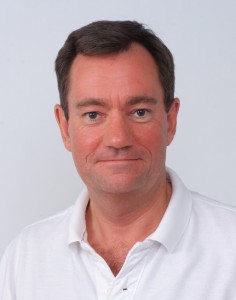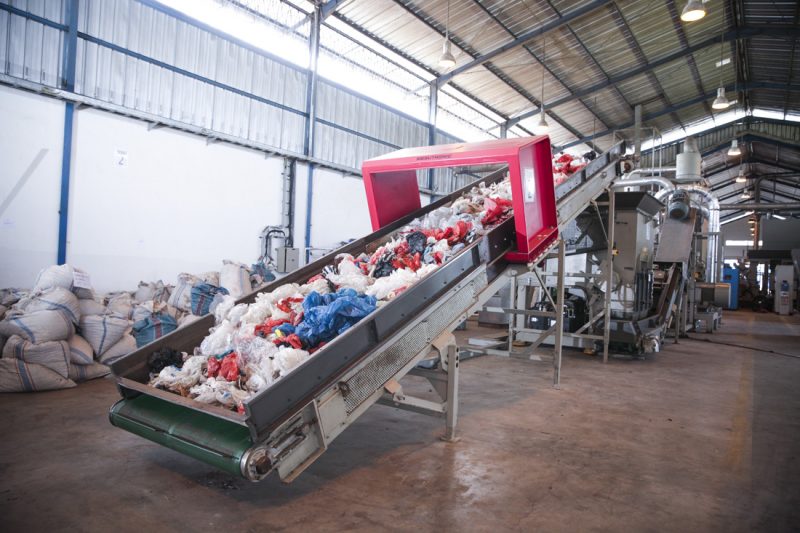Bali (and Indonesia) has received a lot of negative press in recent years with regards to plastic litter. This issue, we meet with PT Enviro Pallets, a manufacturer of nestled pallets made entirely from recycled plastic waste which would otherwise have ended up in landfills. We meet General Manager, Lars Armstrup, to find out more about where the innovative company sources their plastic waste, the manufacturing process, and the their environmentally-conscious values.
Enviro Pallets was founded by Matthew Darby in New Zealand – when and for what reason was the plastic recycling plant opened in Bali?
We started in 2012, moving the equipment across from the previous factory in Christchurch, New Zealand. In visits to Indonesia, Matthew saw a very significant plastic waste issue across the nation, and discussions with the National Investment Agency highlighted the added issues surrounding this in Bali. A strong local desire for solutions to help tackle the plastic waste problem, and to keep Bali Clean, ultimately led to the decision to set up our first Asian factory here.
What excited you about coming onboard?
Having worked for 30 years in logistics and industrial manufacturing in six different Asian countries, I am intimately aware of the challenges around raw-material requirements to keep supply chains moving, specifically the high demand for timber to produce pallets for the movement of finished products.
Global estimates state that more than 40 percent of the world’s sawn timber is used to produce wood pallets. Our unique Thermo Fusion™ technology allows us to use the recycled plastics others do not want, thus benefitting from a low raw-material cost, making our plastic pallets directly competitive with wood pallets, at the same price.
We truly believe we will introduce a real alternative to the use of wood, and the infinite re-use of plastics over and over again. Not only do we use 100 percent recycled plastic, but our products are also themselves 100 percent recyclable, enabling us to use the same plastic raw material multiple times.
Can you give us a brief explanation of the Thermo Fusion™ production process?
We take mixed plastics, shred it and subsequently subject it to heat and pressure, mechanically binding the polymers of the different types of plastics. This results in a malleable plastic substance that under very high pressure is formed into the finished product of a pallet.
The uniqueness of our equipment is that we are able to use mixed plastics of all types in one combined process. This is different to what normally happens in the recycling of plastics. Normally, polymers must be segregated, to for example only contain PET or only HDPE, which is then converted to granules and mixed with virgin plastics for injection moulding processes.
How many tonnes of plastic do you process a day?
We just started our second production line, and with that we can now process more than 600 MTS of plastic per month – most of which would have gone to landfills.
How do you collect the plastic waste used to make your pallets?
We work with recyclers in Bali, who supply steady volumes of plastic to us. We have recently established programmes with the Bali Government’s departments of Sanitation, Gardening and the Environment, allowing us to work directly with the island’s nine regencies and their sub-districts. Two of these are now our active suppliers of recycled plastics, and we continue to engage with the remaining, expecting to have covered all during 2016. Supplies also come from schools and brand retail shops, where we engage with them on campus and in-store to facilitate their efforts to reduce, reuse and recycle.
How much do you pay per kilogram of plastic waste that people bring to you?
First of all, we want clean and dry plastic. Clean means free from non-plastic material such as cardboard, paper, glass, aluminium foil, etc. We can deal with varying degrees of these in the process, but we run the most efficient when these are not present. But for the plastic types themselves we do not distinguish between the different kinds of polymers, as we readily mix them all together in our process.
Our pricing starts at Rp.1,200 per kg of plastic and increases with the cleanliness and dryness of plastic that we receive. Being willing to pay for something that people normally throw away is having a positive impact in the communities that we work with.
Besides the fact that they’re created from plastic waste, what else makes your pallets special?
There are literally hundreds of different pallet sizes and functionalities in use around the world – our process allows us to produce all of them. Plastic is stronger than wood, and therefore gives a better performance over time compared to wood. Even though our pallets will eventually break, the difference with wood is that a damaged wooden pallet has very limited use at the end of its short life. Wood pallets are either burnt (for energy), grinded up (for mulching purposes), or in the vast majority of cases disposed of to rot. Because our process uses 100 percent recycled plastic, we simply take back the damaged pallets, grind them up and run them through our production process again, to be reborn as new pallets.
Please tell us about your expansion plans, especially to Indonesia’s capital, Jakarta.
We have significant ambitions both on a national and global basis. We do expect to expand into Java and beyond in the very near future.
Bye Bye Plastic Bags have been given a MoU by the provincial government in Bali to stop giving away free plastic bags in 2016 and ban plastic bags altogether by 2018. How will this affect production at your plant?
Melati and Isabel, who founded Bye Bye Plastic Bags, are such an inspiration – amazing girls. I met with them recently and banning plastic bags is definitely the way to go. I believe other cities around Indonesia are working on similar schemes. Unfortunately, the global production of plastic continues to rise at about four percent annually, and the sad fact is that even if all plastic bags were banned, it would still only make a small reduction in the total plastic output. There is so much new plastic being made every day.
We cannot function as a world without plastic, but through what we do, we believe we help to move us to a point of ‘no new plastic being put into the world’, as we can infinitely recycle the same plastics again and again, even though they are all mixed.
As the General Manager of a business that actively contributes towards a cleaner world, you must be extremely passionate about what you do. What work ethics that you hold dear to your heart would you like to see other business owners embody?
I love what we do. Few people are given the opportunity to head up an enterprise that truly holds the potential to change a segment of the world, and in this respect our team and I are very fortunate. I am not sure that I am necessarily any different from other business leaders, however I am fuelled by passion – because I believe that is the only way to achieve excellence.
My work ethics are a real sense of purpose, strong determination and focus, which allow you to work through the unavoidable challenges and road blocks that are always present in business. Ultimately though, ‘Deliver The Promise’. What we promise to our customers, all my colleagues, our suppliers and communities is vital, as that is the only way in which we can achieve long-term sustainability both on the environmental front and for ourselves as a business.
Thank you, Lars. To get in touch, email: [email protected]




